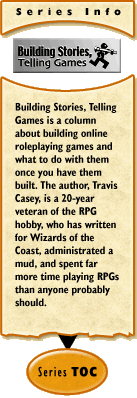
|
Suspense, Conspiracy, and Closing Thoughts on Genresby Travis S. Casey Last time, I talked some about mystery-suspense as a genre. Suspense itself is often considered a genre as well. The genre of suspense is closely related to horror — you could think of it as horror without the supernatural elements. Instead of vampires, werewolves, or Things From Beyond, you've got regular old murderers, rapists, and the like. Suspense is also closely related to mystery. We can distinguish between them by the fact that true mystery stories are centered around what's already happened, while suspense centers on what might happen soon. You can also have suspense without being a Suspense Story, of course — any time you're got the audience feeling tension over what's about to happen next, you're using suspense as a technique. It's a common thing, and a good one to use, since it can heighten an audience's emotional involvement. One thing to note here is that suspense in movies and books is often created by the difference between what the audience knows and the characters know — the audience may know that the characters are going into a trap, or that the killer is somewhere in the building, while the characters don't know these things. In an online game, where the players are both characters and audience, this is much harder to do. In its place, you may wish to use doubt. For example, if the players don't know for sure whether the villain is around the corner or not, that creates a certain level of tension that's not there if they do know one way or the other. This becomes more effective when certain knowledge would make a difference to their plans. For example, let's say there's a ticking time bomb in a building, and there are innocents trapped inside. If the players know there's a trap, then they have to take precautions; if they know it's not, then they don't. If however, they're in doubt, then that faces them with a choice — take precautions as if it were, and possibly not be able to save everyone because of that, or don't take precautions, and possibly get killed. The time relationship between suspense and mystery is also something that can be used in a multiplayer game; you can start off with suspense, as the players try to prevent an unknown enemy from doing something. Then you can move into mystery, as the players try to figure out who was behind the plot. This gives you a fallback if the players fail — they may not have been able to prevent the plot, but they can try to solve the mystery it left now. It also opens the plot up to the possibility of two different sets of characters being involved — one trying to stop the plot, another trying to solve the mystery. Someone's Out to Get Us...Mystery and suspense both blend easily into the genre (or metagenre, I'd say) of conspiracy. Conspiracy stories generally involve at least one Big Mystery — one big enough that it takes a lot of people to hide what's going on. Of course, you can also extend things by having a multiply-layered mystery — mysteries solved give clues or leads on a greater mystery. The classic example here is, of course, the X-Files, but there's plenty of science fiction that predates the X-Files which includes some sort of conspiracy — Keith Laumer used the idea in several of his books and stories, with _The House in November_ being one of my favorites. SF conspiracies usually involve the hero discovering that he/she is special in some way, and usually involve mind control in some way — for a recent movie example, see "Dark City". Conspiracies also pop up in other genres — in fantasy, Fritz Leiber's _Conjure Wife_ and _The Sinful Ones_ both involve conspiracy or conspiracy-like elements. Conspiracies and spy or detective stories are another natural fit — at least at the more "cinematic" end of things. Horror and conspiracy also blend well, with either monsters having mind control abilities of some sort, or there being a group out there which has a vested interest in the keeping "the truth" away from the public. One or more conspiracies can make good background elements for a game world — however, you have to be careful not to overdo things. If everything significant in the world is tied into one conspiracy, that rapidly overwhelms suspension of disbelief. And as well, if a single conspiracy is the root of all evil in the game world, then you're stuck in the position of not being able to allow the players to ever crack the conspiracy, because things would then become too boring. It's also easy for conspiracies to unintentionally turn into comedy — when everyone seems to be part of the conspiracy, the whole thing can quickly turn into one big joke from the players' point of view. Closing UpWell... that's the end of our tour of genres, for now at least. At some point I'd like to return to fantasy and science fiction, and talk about them more in terms of themes instead of subgenres, but that can wait. And something keeps calling me to talk about Westerns, even though I'm not really too comfortable in that genre. See you again in 14 days... for something different!
|
